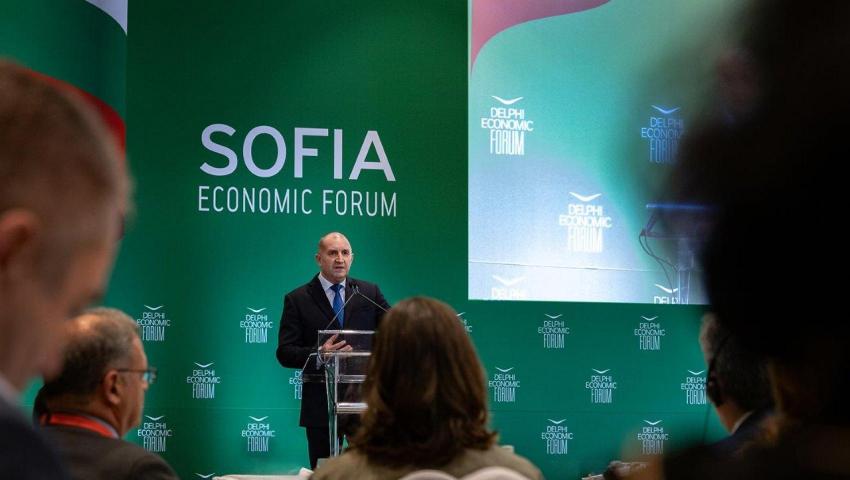The President: At the epicenter of the wide range of problems in Europe is the crisis of leadership, which has two dimensions

The EU must reform its governance structure and decision-making mechanisms in order to act quickly and concentrate resources for strategic ambitions, said Rumen Radev in a speech at the Sofia Economic Forum.
Political and technological changes will continue to provide us with new opportunities for the progress of humanity. In 2024, democracies showed that they take advantage of these opportunities by overthrowing unsuccessful leaders, abandoning outdated ideas and embracing new, well-argued priorities. This was stated by President Rumen Radev during the final part of the Fifth edition of the Sofia Economic Forum. The head of state, accompanied by his wife Desislava Radeva, was an honored guest and lecturer at the event, which is organized in our country by the Delphic Economic Forum.
In front of representatives of institutions, businesses, and diplomats, President Rumen Radev stated that 2025 is shaping up to be a turning point not only for Bulgaria, the region, and Europe, but also for the world, given the unprecedented acceleration of dynamics in geopolitical processes. “The geopolitical security architecture is collapsing, long-established economic models are cracking, recession is settling permanently in leading European economies, and technologies continue to develop more and more rapidly,” said the head of state. In his words, in order to find effective recipes for treating Europe, it is not enough to simply point out the problems. “We must deeply address the causes of the current state, not the symptoms,” said President Radev. In this regard, frank answers are needed to a number of questions, including how the EU has fallen behind in innovation, the energy crisis and the collapse of competitiveness, and the inability to guarantee its own security have come about. Rumen Radev also raised the issue of who will take responsibility for the hundreds of thousands of victims of Ukraine's counteroffensive, which many European leaders have encouraged with the utopian assurance of victory over Russia. The reasons that led to the West's combined gross domestic product compared to Russia being 25 to 1, and Russia producing 3 to 4 times more ammunition and military equipment, according to the NATO Secretary General, must also be pointed out. Meanwhile, for years, the suggestion has been instilled that the Russian economy will collapse, but European governments are falling, and European economic sanctions against Moscow are becoming meaningless due to the purchase of Russian energy resources by countries from the Global South.
“At the epicenter of the wide range of problems facing Europe is the crisis of leadership, which has two main dimensions – competence and honesty. Competence on strategic topics for Europe and honesty towards European citizens and our partners,” said President Radev. In the context of all crises and the overexposed fears of Donald Trump’s inauguration as US President, the Bulgarian head of state pointed out that Europe must take responsibility not only for its own security, but also start building a dynamic and competitive economy, as well as unite and take decisive steps forward.
According to Rumen Radev, the need to increase defense spending should be guided by certain principles and by the unification of European countries around a comprehensive concept of national security, which requires the development of connectivity, logistics, mobility, and the introduction of high technologies. The President pointed out that small countries in NATO - as an alliance of countries united by values, must participate on an equal footing with the others in the development and production of defense products. "Otherwise, the technological gap between individual countries will grow, and NATO will turn into a market with producers and buyers," added Rumen Radev. Regarding the worrying trends in the European economy and the need for investments, the president said that it is necessary to achieve a balance between public funds and private capital, which requires single markets, a common industrial and financial policy, and consolidation of the fragile and fragmented European capital market.
Europe also faces the challenge of whether it will strengthen its role in geostrategic terms, as well as whether it will maintain its moral leadership in the field of human rights, the rule of law, peace and environmental policies. The EU has been leading in its green policies for a decade, but we must not lose, but strengthen our competitiveness, said the president. Rumen Radev added that the pro-liberal and pro-market European approach must also be tempered against the backdrop of the more protectionist policies of other global players.
The head of state expressed expectation that Europe will overcome the challenges successfully, but for this, the EU will have to deeply reform its governance structure and decision-making mechanisms so that it can act quickly and concentrate significant resources for its strategic ambitions. According to the President, the new priorities of the European Commission for the promotion of scientific research and innovation, technology, as well as the achievement of Strategic Autonomy are steps in the right direction for the development of the economy and show awareness of the problems.
Rumen Radev also stated that the admission of Bulgaria and Romania to Schengen will provide a positive economic impulse in the regional plan. Our country also contributes to the development of an innovative and full-fledged economy - from the extraction of raw materials and their processing, through heavy industry and metallurgy, the extraction and storage of energy from its own sources, to digitalization and high-tech production, the President pointed out. Rumen Radev highlighted our country's consistent efforts to improve connectivity with neighboring countries in various directions, expressing his expectation for the Republic of North Macedonia to realize the importance for Europe of the implementation of Corridor 8, as well as the upgrading of transport links with Romania along the Danube River.
